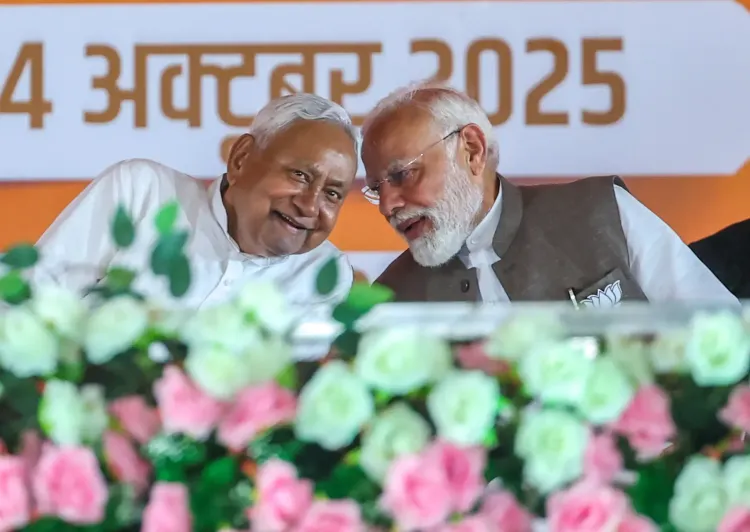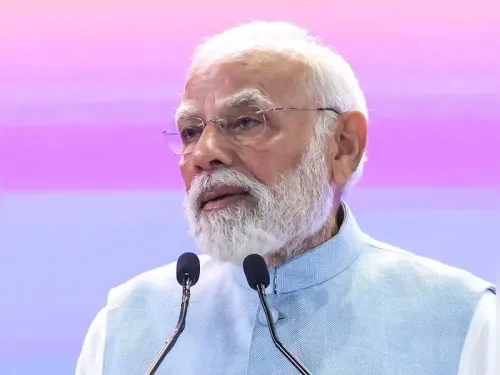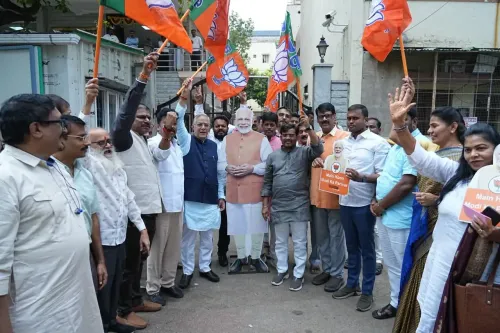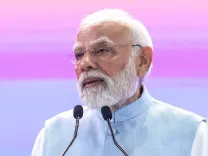Is the NDA's Good Governance Strategy Driving Bihar's Economic Growth?

Synopsis
Key Takeaways
- NDA's governance initiatives have significantly impacted Bihar's economy.
- Direct Benefit Transfer programs have ensured leak-proof benefits to the needy.
- Women empowerment initiatives are yielding high electoral engagement.
- Substantial growth in GSDP reflects effective economic policies.
- Voter support shows a preference for stability and governance.
New Delhi, Nov 14 (NationPress) As the vote counting commenced on Friday for the 243-seat Bihar Vidhan Sabha, the initial trends showcased a significant backing for the National Democratic Alliance (NDA), driven by the effective execution of Prime Minister Narendra Modi's core good governance programs in conjunction with Chief Minister Nitish Kumar.
Key to this achievement were revolutionary schemes implemented through the Direct Benefit Transfer (DBT) framework, ensuring that support reached the right recipients without leakage, empowering millions and facilitating real economic progress.
More than 86 lakh farmers in Bihar have benefited from an annual aid of Rs 6,000 each under the PM-KISAN Samman Nidhi, while Ayushman Bharat has extended free health coverage of up to Rs 5 lakh per family to millions, significantly lowering out-of-pocket healthcare expenses.
The Jal Jeevan Mission has successfully provided piped water to nearly all rural households, complementing state initiatives like prohibition and enhanced safety for women. The Ujjwala Yojana has supplied clean cooking fuel to countless women, freeing them from the hazards of smoke-filled kitchens.
These initiatives, which align with Nitish Kumar's focus on law enforcement, rural development, and women's empowerment—evident in programs offering bicycles, scholarships, and credit for self-help groups—have collectively strengthened the narrative of “Sushasan”, or effective governance, directly impacting lives and diminishing memories of prior misrule often described as 'Jungle Raj'.
The clear outcome was rooted in micro-economic improvements that voters could perceive.
The Bihar Economic Survey 2024-25 estimates that the state's Gross State Domestic Product (GSDP) for 2023-24 has grown by 14.5% at current prices and by 9.2% at constant (2011-12) prices compared to the previous year. The per capita GSDP in Bihar is projected to rise by 12.8% to Rs 66,828 and by 7.6% to Rs 36,333 at constant prices in 2023-24.
Moreover, the GSDP of Bihar for 2023-24 is anticipated to reach Rs 8,54,429 crore at current prices and Rs 4,64,540 crore at constant prices.
The tertiary sector is expected to contribute 58.6% to the Gross State Value Added (GSVA) at constant prices, followed by 21.5% from the secondary sector and 19.9% from the primary sector, indicating ongoing development amidst national initiatives.
Multidimensional poverty has decreased from over 50% in 2015-16 to approximately 34% recently, attributed to DBT-enabled welfare and infrastructure growth, with rural road coverage expanding from merely hundreds of kilometers in 2005 to over 1.17 lakh kilometers today.
A record female turnout exceeding 71% highlighted how empowerment efforts—such as credit linkages for over 2,000 self-help groups amounting to Rs 46,900 crore—translated into electoral commitment.
By midday, Election Commission figures indicated the NDA ahead, comfortably surpassing the majority threshold of 122 and on track for a tally nearing 200 seats, representing one of its strongest mandates in decades.
The Bharatiya Janata Party led in 91 seats, Janata Dal (United) in 79, and the Lok Janshakti Party (Ram Vilas) in around 22, with smaller allies providing additional support. In contrast, the Mahagathbandhan fell short of 40, with the Rashtriya Janata Dal at 27 and Congress struggling at four.
The opposition's limited emphasis on employment pledges and caste enumeration did not resonate against this backdrop of stability and achievement, even in traditional strongholds.
Prashant Kishor's Jan Suraaj had minimal impact.
For Nitish Kumar, this sets the stage for a tenth term as chief minister, solidifying his legacy and enhancing the BJP's position within the coalition. The outcome underscores Bihar's commitment to the national vision of inclusive growth, paving the way for accelerated development towards a Viksit Bharat.









